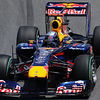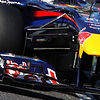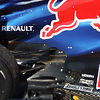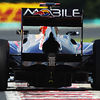Q+A with Adrian Newey

Just before the RB6 was launched at Jerez yesterday, Adrian Newey, Red Bull Racing's chief technical officer, talked about the new car and new 2010 regulations, which will spice up Formula One racing.
How much, if at all, were you hindered in building the RB6 by Red Bull Racing’s battle for the 2009 championship? "For 2010 the regulation changes have been relatively small and meant any research for the 2009 car was relevant to this season, as a result there was much less of a choice to be made between 2009 and 2010 development. We initially concentrated on the challenges of almost doubling the size of the fuel tank from the no refuelling regulation and what impact the narrower front tyre would have. The 2010 aerodynamic work started around June, looking at the monocoque where there’s been a small regulation change to the V-section chassis we use. The rest of the chassis work was aerodynamic optimisation and accommodating the extra 70-odd kilos of fuel."
What are the main differences between the RB5 and the RB6? "The car is very much an evolution of the 2009 car – there is a big family likeness. We tried to refine and evolve it rather than go to new concepts. As such, the car looks similar with elements such as the chassis and pull-rod rear suspension retained."
What were the main challenges when designing the RB6? "The two obvious ones are the fuel tank and the knock-on effect of that and the smaller front tyre. In addition, there are the normal challenges of trying to evolve the car and make sure that it’s faster than its predecessor."
How much have the 2010 regulations affected the design of the RB6? "There’s more to it than simply putting a big fuel tank in the car. The bigger fuel tank puts more load on the brakes, so the brake cooling has to cope with that. You also have to consider what effect that extra fuel will have on the tyre degradation early in the race and if there’s anything we should change mechanically to cope with that. The narrower front tyre changes weight distribution and the balance of the car."
What do you like most about the RB6? "It’s a question I’m often asked and always struggle with, to be honest with you. I hope it’s a sensible evolution of the 2009 car. One obvious difference is that the 2009 car was not designed to suit a double-diffuser and we had to try to put one on as best we could around the existing rear suspension and gear box. With this car we’ve been able to design the car from scratch."
Do the different heights of Sebastian and Mark affect design? "The car has to be designed around Mark, which means the cockpit has to be a bit longer than the minimum regulation and the fuel tank has to be moved rearwards slightly because fuel is not allowed to be stored ahead of the driver’s back. Once we’ve done that then fitting the shorter driver in, Sebastian, is relatively easy."
What was the thinking behind the later launch date of the RB6? "We wanted to give ourselves as much time as possible to research and develop the car. Because the car is evolutionary we didn’t need to be out early to establish its basic concepts, so we wanted to allow ourselves as much time as possible to research it."
How do you feel about staying with Renault for 2010? "We’ve been very happy with the partnership and the support Renault has given, particularly when we’ve had problems. When we were short on engines with Sebastian last season or when there was development we needed to do in the middle of the year on the engine mapping, Renault was very helpful. The reason we looked at other manufacturers was because it was clear one had gained a large power advantage. But we’ve had discussions with Renault and are confident they will redress that imbalance."
What are your realistic hopes for Red Bull Racing in 2010? "That we put on a performance that we can be proud of - as long as we feel we’ve got the best out of what we have then I’ll be happy with that."
Source Red Bull






